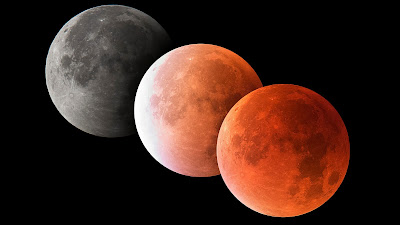Hits Your Eye +10 Years Later
Like A Big Pizza Pie, That's Emor, Eh?
In Napoli, where love is king
When boy meets girl, here's what they say
One decade ago this very week (see When The Moon Hits Your Eye), the whole world celebrated
the Supermoon of 2012, whereby our one and only Moon came as close to
our one and only Earth as it ever will, until the next time.
Here in Albuquerque, much of the Moon's magnificence was obscured by an unruly bunch of dark clouds, a rarity in the Duke City, but whose untimely timing seemed to portend something bigger and ... yes, better.
Well. Beginning at 7:49 pm on Sunday, May 15, 2022, and ending at 12:50 am on Monday, we here in New Mexico, the Land of Enchantment, will experience (and may even get to see) a Total Eclipse of the Blood Moon.
But the Shabbat before that momentous event - this very Shabbat, Abq Jew reminds you - is one of the occasions during the Jewish year when we get to read (from, for those following the triennial or other non-traditional Torah reading cycle), Parshat Emor ("Say").
In Parshat Emor are enumerated all the Jewish Festivals and the laws and customs surrounding same, making these portions a popular Torah reading for Sukkot (twice!) and Pesach. Only on Shavuot, the Holiday of Mystery, do these portions of Parshat Emor go unread. "Why?", Abq Jew hears you ask.
Abq Jew has no answer for the first question. Meanwhile, the answer to the second question is: yes and no.
In Parshat Emor are enumerated all the Jewish Festivals and the laws and customs surrounding same, making these portions a popular Torah reading for Sukkot (twice!) and Pesach. Only on Shavuot, the Holiday of Mystery, do these portions of Parshat Emor go unread. "Why?", Abq Jew hears you ask.
And furthermore, Abq Jew hears you ask:
Didn't we read Parshat Emor last week?
Abq Jew has no answer for the first question. Meanwhile, the answer to the second question is: yes and no.
Or, to be more explicit: YES, if you were in the Land of Israel or a Reform temple last Shabbat, you did indeed read Parshat Emor. But NO, if you were anywhere else in the whole wide world, you read Parshat Kedoshim.
And next - Abq Jew hears you ask:
Why is that? How come?
Please allow Chabad's very own Mendy Kaminker (a member of the Chabad.org editorial team and rabbi of Chabad of Hackensack) to explain.
Please note that Reform temples follow the Torah-reading calendar of Israel. If you ask why - that is the wrong question. The correct question is - why doesn't everyone follow Israel's Torah-reading calendar?
Once in several years, for a few weeks, different Torah portions are read in Israel and in the Diaspora. This year (2022-5782) happens to be one of those years.Why does this happen? Here is the basic idea:
- The Torah is apportioned into 54 readings, and each Shabbat we read a portion according to a predetermined order. When a holiday falls on Shabbat, we substitute the reading of the weekly portion with a section from the Torah that relates to that holiday.
- In the diaspora, the holidays of Sukkot (and Shemini Atzeret), Passover, and Shavuot are celebrated for an extra day (known as "the second holiday of the Diaspora").
This year, the holiday of Passover started on Shabbat. In Israel it was celebrated for seven days, ending on Friday. The next day was Shabbat and everyone there read the Torah portion of Acharei Mot.Outside of Israel, however, the holiday was celebrated for an eighth day, when everyone read the Torah reading for the final day of Passover. The Torah portion of Acharei Mot wasn't read until the following week—by which time synagogues in Israel were already up to the next portion, Kedoshim. That's how Diaspora Jews ended up behind by one portion.But no worries: We in the Diaspora will soon catch up with our Israeli brethren. How? Because on the Shabbat of 2 Av (July 30), those in Israel will read the Torah portion of Masei, while we will read two portions—Matot and Masei—joined together. Once again, all the Jewish People will be in synch.
That's Emor, Eh?




No comments:
Post a Comment